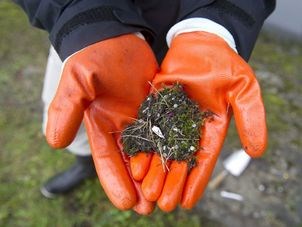Hundreds of thousands of tiny plastic pellets used to make bags, bottles and other plastic items are being washed into B.C. waterways and the province isn't doing enough to stop it, says a group dedicated to cleaning up beaches.
Surfrider Canada says it has evidence pellets are being spilled at manufacturing plants and during transport and are making their way into the water at dozens of locations it monitors around B.C.
The U.S.-based international environmental group held a news conference on Annacis Island near a water channel, and David Boudinot of its Vancouver Island chapter knelt on the riverbank to show how the round pellets, which are smaller than a lentil, can be easily found in the grass.
He held a small jam jar full of the pellets, collected last month as far away as Nigei Island, north of Port Hardy.
Volunteers have collected pellets from 90 locations, in the Fraser River and on shores around Metro Vancouver, from the San Juan and Gulf islands, around Vancouver Island and along the Sunshine Coast, he said.
He said his group investigated manufacturing and transport sites.
"You go to where they're used and there is spillage. If there's a spill on the parking lot, once it rains, it goes down there," he said, pointing to the water while a group of mallards paddled by. "You go look at their storm drains and you see all the pellets."
Surfrider picked Annacis Island because there are three plants that manufacture the pellets on the island, he said. The group didn't identify the companies.
He said plants should be required to properly cover storm drains, as they do at construction sites.
"Prevention is key," said Boudinot. "There's a clear solution."
And he said manufacturers or transporters should contain the spills, which he called a "solidified oil spill" because the pellets are petroleum-based.
"If a company spilled oil, they would be fined, yet you solidify the oil and you can release that into the water? That's crazy."
He said companies need to clean up its spills or face fines.
"It's the responsibility of the province of B.C. to enforce environmental protection laws and to improve environmental protection laws," said Boudinot. "There are no regulations specifically for plastic pellets."
He said, "We've shared our evidence of the problem with the province" and was told the province is holding public consultation on plastic pollution.
But Boudinot said it's an industry, not a consumer problem, and "I don't think we'll be able to recycle our way our of plastic pellet pollution."
B.C.'s Environment Ministry didn't make anyone available to comment but said in an email "Discharge of pollution to the environment is prohibited under the environmental management act."
The ministry said it had been unaware of the problem of plastic pellets in provincial waters.
The province is "working to reduce plastics in the marine environment" and is assessing its next steps, but staff didn't provide specifics.
Requests for comment from B.C. plastics companies on Annacis Island weren't returned, and the Canadian Plastics Industry Association in Ontario didn't return messages.
Its website said it has signed a joint declaration with 46 plastics industry organizations worldwide to prevent marine litter.
Its Operation Clean Sweep, "an international program designed to prevent pellet, flake and powder loss," which it said could harm sea life and wild life, encourages members to take a voluntary pledge to "prevent resin pellet loss in the environment."
Of the more than 130 Canadian companies listed as having taken the pledge, five are in B.C.


